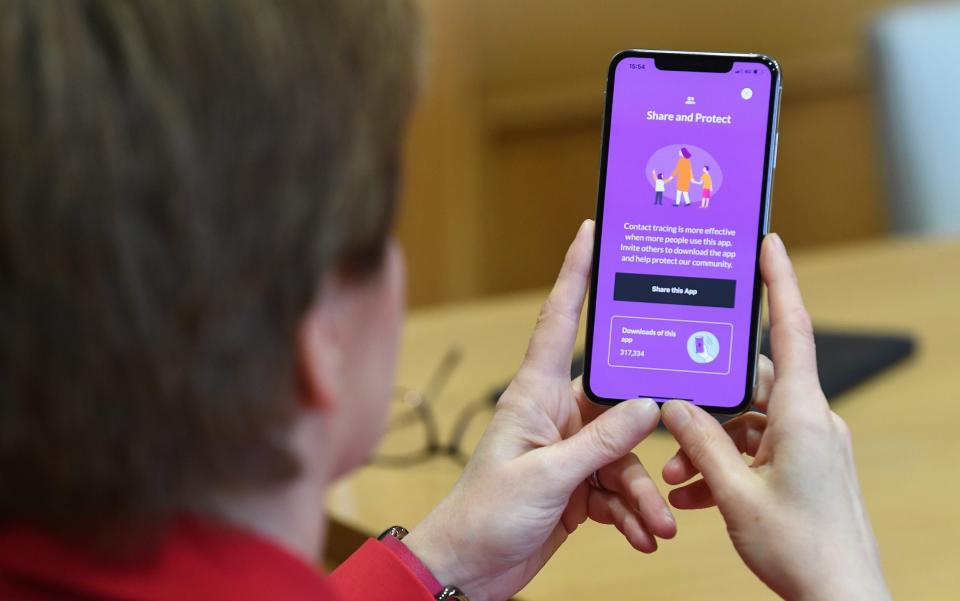Scots heed Sturgeon's call to download new Covid contact tracing app

Around half a million Scots downloaded a new coronavirus contact tracing app on Thursday despite the risk that it could lead to them being ordered to self-isolate for two weeks.
Nicola Sturgeon said the technology, which will tell people to self-isolate if their mobile phone detects that they have come into recent close contact with someone who tests positive for the virus, would prove a valuable tool in the fight against Covid-19.
Officials said they were delighted with initial uptake of the Protect Scotland tool, although it will have to at least double before it becomes useful.
Meanwhile, they also acknowledged that there is a risk that the app could see some people could needlessly be told to remain at home, with readings potentially affected by components in different mobile phones, leading to "false positives" being sent out.
People with older smartphones also struggled to download it, with the technology not working on models more than five years old.
I've downloaded the Protect Scotland app, have you? Details here, along with click throughs to either Apple or Google Play app stores. https://t.co/QJxwNgJehC
— Ruth Davidson (@RuthDavidsonMSP) September 10, 2020
“The launch of the app is a welcome development which will offer an additional level of protection,” Ms Sturgeon said. “I would encourage everyone to download the free app if they have a compatible smartphone, and help slow the spread of Covid-19.
“The more people who download and use the app, the more effective it can be in helping to make connections that may otherwise have been missed. This will allow people to self-isolate quickly if they are exposed to the virus, reducing the risk of them infecting others.”
Developers could also not guarantee categorically that a signal will never travel through walls, with “variables” such as what they are made out of having an impact on signal strength.
This potentially means people could be recorded as having been in close contact with a virus carrier living in a next door flat, even if in reality there was no chance of ever catching it from them, although they say testing in Ireland where a similar app is in use found this does not generally occur.
Because all data is anonymous, someone told to self-isolate will be informed of the day they came into contact with a person who had tested positive, but not where they were when it happened or who it was.
Despite admitting that the technology is “not perfect”, health officials believe that on balance the benefits of the app - allowing people to be traced who a person testing positive does not know personally - outweigh the downsides. They say similar technology has been used effectively in other countries.
They believe it will become useful if 15 per cent of the population - or 820,000 people - use it. As of 7:30pm on Thursday, it had been downloaded 440,000 times. It is believed that 3.2 million people in Scotland own a smartphone, although it will not work on older models from before 2015.

The app works through bluetooth technology, used for exchanging data wirelessly. Phones belonging to people using it will anonymously log other devices nearby where the app is also installed.
If someone using the app tests positive they will receive a code. If they input this into their phone, all people who they are believed to have been in close contact with - defined as within two metres for 15 minutes or longer according to readings - will receive a notification telling them to self isolate for 14 days.
Messages will be sent to all people logged as a close contact over the 48 hours before a person tested positive or first developed symptoms.
The strength of the signal between two devices is used to estimate the distance between two people, although officials admit that judging distance using this method is “challenging”. Different types of phones, as well as environmental factors, can impact on signal strength although it is claimed the system is “sufficiently accurate” to allow the technology to be useful.
At Holyrood, leaders from across the political spectrum endorsed Ms Sturgeon’s call for the public to download the app. Ruth Davidson, the Scottish Tory leader at Holyrood, said she “did my bit and downloaded it”, although she pointed to separate studies that estimated that between 56 and 95 per cent of the population would need to use it for it to be successful.
Although its price tag has not been finalised, The Scottish Government spent less than £300,000 on technical development costs, with a decision by Ireland to make technology it developed freely available saving money.
Cian Ó Maidín, chief executive of developer NearForm, said: "We’re delighted to partner with NHS Scotland on the Protect Scotland app which puts power in citizens’ pockets to join the fight against Covid-19.
“This open source technology was built with privacy and data protection at its core and, through anonymous keys, allows Scottish citizens to engage, protect each other and break transmission chains.”

 Yahoo News
Yahoo News 
